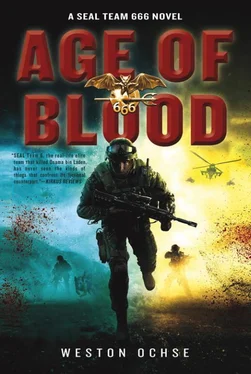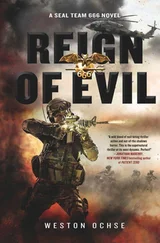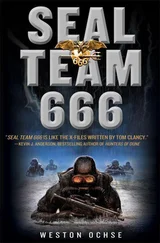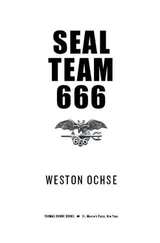As Walker turned to leave, he saw YaYa rubbing at his left arm. Whatever it was, it was a stubborn healer.
He left, walked down the hall, and paused. Two weeks earlier he’d returned to Quezon City. He’d returned to the Philippines to try and lessen its hold on him. Walker had thought about going back for years, but had always been afraid that his presence might bring back the things that had happened to him. But after the mission to Myanmar, he believed that there was little left of the grave demon which had once inhabited him except for an exceptional ability to detect the presence of something supernatural in others. They’d tried his powers on the two-hundred-plus years of trophies that adorned the walls of the Pit only to discover that they were copies, the real ones removed to the Salton Sea Research Center, where he eventually spent a week moving among the artifacts, fine-tuning an ability that had once merely been a nuisance.
So standing on Flores de Mayo Street on a warm, misty Manila afternoon, he was at once struck by how different everything was and yet how similar it all seemed to him. For so long he’d been that terrified child of eleven who’d found himself living on the streets, his father dead, his brother far away, his mind enthralled by the vicissitudes of a demon laid upon him because of his father’s greed. Now the U.S. Navy had pulled out. No longer were there colorfully dressed hookers and garish signs, neon innuendos promising happy endings for all. The stench of garbage was slight on the wind, nothing like the terrible rot that had anchored his memories. Gone were the piles of trash. Gone was the gnarled old man he’d chased down the street. All that was left was a stain on the concrete where he and a million others had peed, slept, lived, wept, and prayed, a way station atop an impermeable concrete surface.
He’d stayed at the Crown Plaza on Ortigas Avenue for two nights before he’d gathered the courage to seek out the orphanage. The Franciscan monks there had been fierce in their determination to mold him into something other than a Caucasian mutt with no future. Had he the wherewithal, he might have succumbed. But those years were so filled with a feeling of helplessness, he doubted he could have changed even if he’d wanted.
Finally he’d dared to go. He’d taken a jeepney across the city, wedged in between a woman with a live chicken stuffed into an admirably realistic Coach bag and a young man playing a first-person shooter on his iPhone. Several times Walker had closed his eyes to try and bring back the child he used to be, but try as he might, that boy had been exorcised along with his demon. The child who’d dreamed of his father coming back and saving him was gone forever. Where before he fit into Filipino culture like a native, he now felt foreign, only understanding every other word, whether out of mental spite or because he’d purged the necessary knowledge to translate.
Then he was there.
St. Francis School for Boys .
The orphanage was smaller than he’d imagined, but then again, he’d been smaller too. The world had been smaller. But as small as it was, it had seemed immensely imposing. With a steepled center, two wings flowed from right to left. Three stories, each window had white painted wooden shutters that he remembered chattering during the many storms like his own teeth when the monks set their eyes upon him.
Then a memory hit and almost drove him to his knees. The Filipino monks had tried to insist he speak Tagalog, withholding anything other than old rice and water for weeks until he was able to learn enough rudimentary words to please them. He could still picture himself hammering his little fists against the stout wooden door of his closet-sized room, begging for food, milk, his father, his brother, television, comic books… anything to sustain him and keep him from realizing that his parents were dead and he’d been ripped from everything he knew.
Walker felt faint as the heat of the past filled him. He knew his face was red. A pair of Filipinas scooted away, avoiding him as if he were a common drunk. They hurried down the street, much as they would have had they known him when he was younger, wrapped in entrails and feces.
His first year in the orphanage had been perhaps his worst. He was forbidden to speak English. The Franciscan monks were constantly watching to see if he’d lapse. They seemed eager for him to speak his native tongue. Punishment was delivered immediately whenever they even suspected that he’d slipped into the language of the colonialists, as Brother Sindep referred to any American or European dialect. The inability to communicate was one of the most torturous punishments he’d ever received. Not being able to explain that something hurt, not being able to relate his fears, not being able to socialize with the other kids, all of it left a hollowness in his chest as wide and deep as the hole created by the death of his father. So when Yevgeny Marcos arrived at the orphanage, Jack saw in the white-skinned, half-Russian, half-Filipino the possible antidote to his agony.
At first they were kept separate. Jack would only get fleeting glances of the other from across the schoolyard, or in the hall between classes. There were 950 boys at the orphanage and they were but two specks of white in a great yellow melting pot of childish anguish.
Yevgeny was a walking target. Small and frail, he had the frame of a girl rather than a boy. Jack would discover later that it was because of a year spent in bed from meningitis, but when he first saw the other boy, he’d been curled beneath the kicking feet of a dozen Pinoy boys. The second time was when they’d both hidden in the coal cellar. They’d rubbed the dust over their skin and pretended to be Pinoy , each of them speaking in broken Tagalog, pretending to be anyone other than who they were.
They became fast friends after that. Although they weren’t allowed to spend time together, they’d exchange glances and hand signals from across crowded rooms. They’d find reasons to sneak away, often returning to the same coal cellar that had brought them together.
But ultimately they were found out. The Pinoy boys began to call them bakla , shouting it whenever the monks were out of ear shot. They made sexual gestures, often pulling down their pants and waving their childish peckers suggestively.
Jack had already learned to fight. He had gotten better each time he was beaten and now was at the point where he could defend himself.
But Yevgeny wasn’t so lucky. He was too small. He was too sickly. He just didn’t have the heart. It wasn’t long before he climbed to the fourth floor of the dormitory, the floor where the monks lived, found an open window and stepped out. He hit the ground face-first.
Jack had seen it happen. In fact he’d called after the boy when he’d gone inside, but Yevgeny had ignored him. To this day Jack wondered if he had said something different, maybe gotten his attention, Yevgeny might not have killed himself.
The monks had said that the boy had died because he couldn’t come to terms with his sexuality. It was a load of bullshit, of course, but they tried to make it a teaching point for the other kids. As if the death meant anything other than that the poor boy was dead.
Walker had to be careful. He knew what he was doing and it wasn’t healthy. Jen had counseled him on his idea that he had to fight to repay the dead. The dead weren’t owed anything, she’d told him in so many words. The living was who he should be fighting for. He should be fighting to make them safe. He should be fighting to return to them. To fight for something other than that was a rabbit hole from which he’d never return.
EXORCISM CHAMBER. LATER.
Walker was gone thirty seconds before YaYa let out his breath. He hoped he’d put on a good enough show. What had happened was so terrifying that his toes were still curled and the muscles along the base of his spine were still clenched. If this had been anywhere near what Walker had gone through, then YaYa’s appreciation of his fellow SEAL skyrocketed. Flashes of the priests screaming at him and him screaming back were interspersed with rapid-fire images of torment, him in different poses as if seen by a third person—coiled and ready to strike, curled in a ball, standing empty-eyed, frothing at the mouth, barking at shadows, laughing uncontrollably. It was as if he’d become a mere passenger in his own mind. Whatever had taken him over had shoved him aside and taken control, and if it hadn’t been for the priest and the Knights of Valvanera, he’d still be in the thing’s grip. What had the priest called it? A little demon? YaYa couldn’t imagine the full power of a big demon.
Читать дальше












